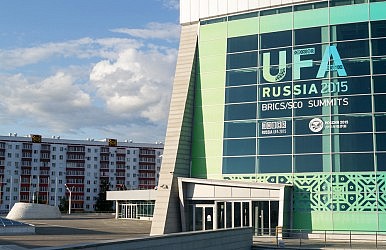
Leaders from the BRICS countries and members of the Shanghai Cooperation Organization (SCO) are arriving in Ufa, Russia for their twin summits. Russian media is also reporting a meeting of the Eurasian Economic Union (EEU) countries. RT is live-blogging, Modi tweeted a picture shortly after arriving and the Chinese released a handy explainer cartoon complete with a bicycle built for nine (ridden by the leaders of the BRICS and SCO). The festive atmosphere—RT reports that 10,000 visitors are expected to come through Ufa—belies serious questions of what direction the various organizations are moving in, how much, if at all, they matter, and how the Russo-Chinese relationship will shape the region’s future.
Russia seems to be the center of Eurasian diplomacy at the moment–coincidentally both summits are held on a rotating basis–hosting lends Moscow a glamour of international support. As Greg Shtraks pointed out in his preview of the BRICS/SCO summits last month, two sides have emerged globally–with Russia, China, and a “coterie of Eurasian autocracies” standing apart from the G-7, led by Europe and United States, which has reinforced its relations with East Asia. But while Russia is hosting, it is China’s economy (not counting the current stock-market meltdown), that drives the BRICS and China’s demand for energy and Silk Road plans that enrich Central Asia.
Björn Düben, writing for Reuters, notes that while in the past year it has seemed that Russia and China were teaming up at last, reality is more complicated. “[M]ore than a year after the two countries initiated most of their bilateral projects,” including a much-hyped $400 billion dollar natural gas deal, “there has been no significant progress, and some projects have been abandoned altogether,” he says. China may not have joined the West in imposing sanctions on Russia after the annexation of Crimea, but it hasn’t recognized Russia’s claim either.
The organizations gathering in Ufa are part of a confusing tapestry of multilateral groups criss-crossing the region and beyond. Moritz Rudolf, a China foreign policy expert at the Mercator Institute for China Studies (MERICS), told DW that, “There seems to be an attempt to boost cooperation between the SCO and the BRICS. Especially a 90-minute session between the leaders of the Eurasian Economic Union (EEU), BRICS and SCO as well as from Azerbaijan and Turkmenistan, is a sign that Russia is aiming for political block-building.”
BRICS includes five emerging economies–Brazil, Russia, India, China and South Africa. The Ufa summit, the group’s seventh formal meeting, is expected to deliver a “roadmap to 2025” to guide the association’s development. Unlike the SCO or EEU, BRICS is less an organization than it is a forum defined by its exclusion of dominant western economies. Brazil and South Africa stand apart from Russia and China with regard to how they view the current international order–with the former more comfortable within the Western-dominated system and Russia and China chafing at it. The BRICS are expected to launch the New Development Bank (NDB), which South African Minister of International Relations and Cooperation Maite Nkoana-Mashabane said would focus on infrastructure development projects.
As for the SCO–a group started in 1996 with a focus on military cooperation–attention will be on the organization’s expansion, in terms of membership and focus. The possible movement of India and Pakistan from observers to full members–rumored during last year’s summit as well–might not matter too much (as Ankit Panda explained yesterday). But what could matter is the SCO expanding into the economic realm, as indicated in a as a recent report by the Russian International Affairs Council. While the SCO Development Bank looks to be a bust–overtaken by the BRICS NDB and China’s Asian Infrastructure Investment Bank (AIIB)–the SCO can still help link the EEU to China’s One Belt, One Road. The Chinese ambassador to Russia, Li Hui, according to Xinhua, said that the SCO should set cooperation in transportation, energy and agriculture as additional priorities. While linking the EEU to the Silk Road makes sense, it’s not clear how it would be accomplished.
This week the BRICS will attempt to chart a course and the SCO may manage to expand, meanwhile Russia will try to link its EEU to the Chinese road. The West will be watching and waiting.
[“source – thediplomat.com”]
